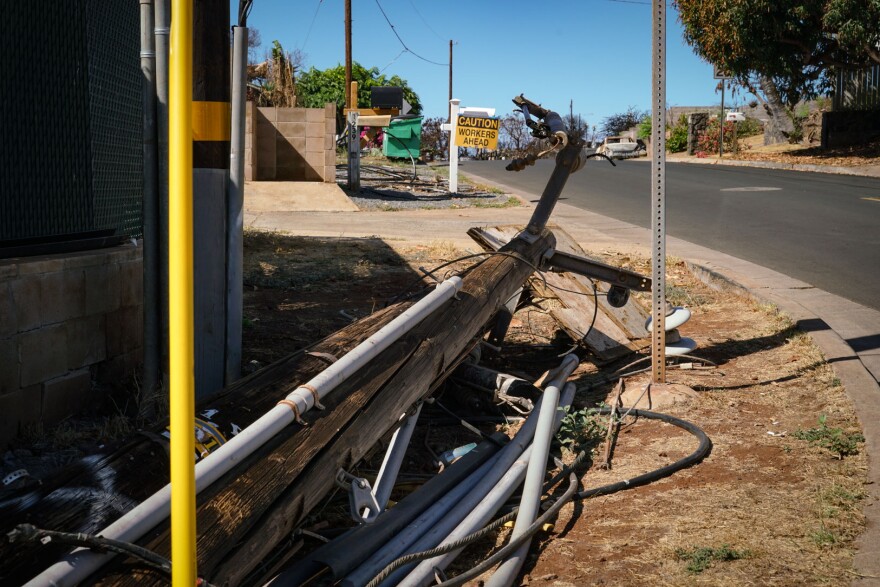Nearly eight months after wildfires blazed through Lahaina, the state of Hawaiʻi and Maui County may finally offer the public some insight into what exactly happened on Aug. 8.
On April 17, the Department of the Attorney General is expected to release a report with "a comprehensive timeline of events" from the first 72 hours of the fire.
The Maui Fire Department, along with the Bureau of Alcohol, Tobacco, Firearms and Explosives, is preparing another report on the cause of the fire. Honolulu Civil Beat reported that MFD could have that account ready by late April.
But some lawmakers think that the Public Utilities Commission should be taking the lead in investigating how the fire started.
A Senate resolution is calling for the PUC to open its own formal public proceeding, called a “docket.”
So far, the PUC has held off on launching a wildfire investigation docket, citing concerns over duplicating efforts of other agencies and a lack of resources.

Sen. Jarrett Keohokalole is unimpressed by the PUC's reasoning. He chairs the Commerce and Consumer Protection Committee, which passed the resolution stating the PUC has "failed" in its duty to examine the cause of the fire.
The PUC is required by law to investigate any loss of life related to the operations of Hawaiʻi's utilities. But state statute isn't specific on when or how that investigation should take place.
In its written testimony on the resolution, the PUC laid out several steps it had taken to fulfill its statutory mandate, but Keohokalole said those actions were "not good enough."
Keohokalole said it's crucial that the PUC open its own docket to protect the independence of the fire investigation. Both the state and Maui County face liability for the fire, which Keohokalole called a potential conflict of interest.
"The two primary investigators of the fire are implicated in the fire itself," Keohokalole said. "The PUC can remedy that by opening a docket.
The PUC maintains that it doesn't have the expertise to conduct a forensic analysis into the cause of the fire.
"We don't have the resources to really engage in that kind of effective counterpoint," said PUC Commissioner Colin Yost in testimony before Keohokalole's committee.
Keohokalole dismissed that explanation, noting that the PUC has not made any requests to the state Legislature for additional funds.
"If you say you don't have the resources to conduct an investigation of the deadliest wildfire in Hawaiʻi and United States history, then, in order to fulfill your responsibilities, you should have asked for capacity," Keohokalole said.
A PUC spokesperson told HPR that the commission "currently does not have any staff solely dedicated to full-time wildfire investigation," but said that may change depending on the results of "the AG's report and the Maui Fire Department’s report, and/or passage of related bills this legislative session."
Even more robust regulatory agencies don't always conduct their own forensic fire analysis, according to Forest Kaser, the deputy executive director of Safety and Enforcement at the California Public Utilities Commission.
The CPUC has far more resources than Hawaiʻi's PUC, but Kaser said it's still beyond their capacity to conduct their own wildfire causation analysis.
"We don't have those types of experts in-house. It's just really not our jurisdiction," Kaser said.

The CPUC relies on California's state and local fire agencies to determine the cause of wildfires, but Kaser said he wasn't aware of a single incident in California where agencies implicated in a fire have been tasked with investigating themselves.
"I don't believe I've ever encountered a situation like that," Kaser said.
Henry Curtis, executive director of the community action group Life of the Land, has concerns about transparency at the PUC that go beyond the wildfire investigation. Curtis, who has been involved in dozens of PUC dockets over the years, said he's noticed a distinct change at the commission.
"Since the wildfires [on Maui], there has been a general shift in the Public Utilities Commission, in that they have become less transparent on reliability, rolling blackouts, and fires," Curtis said.
The Public Utilities Commission declined an interview for this story.
During the hearing last month, Commissioner Yost told senators that the PUC was prepared to change tack if necessary.
"I can say that our options are always open. We're ready to change course, at any moment, if it's appropriate," Yost said.
Curtis applauded lawmakers for calling the PUC to take action but added that they should make sure transparency is preserved in all aspects of the wildfire response. He pointed to a number of measures introduced this session that would allow state agencies to operate behind closed doors.
One of those measures is Senate Bill 2922, introduced by Sen. Keohokalole. It would create a process for electric utilities to develop and submit wildfire protection plans to the PUC.
Life of the Land, as well as the Department of Commerce and Consumer Affairs and environment-focused impact investment group Ulupono Initiative, have raised concerns that the language of the bill would allow the PUC to approve those plans without a formal docket, and therefore without an opportunity for public input.
"Either the Legislature does not understand what a non-docket is," Curtis said, "or they are willing to accept that the Public Utilities Commission can figure out the whole fire stuff through more secret proceedings as long as they actually move. "
Keohokalole said that bills go through several iterations before they reach their final form.
"The bills are moving targets," Keohokalole said. "There are a lot of issues that we're trying to address when it comes to the wildfire and HECO and the path forward."
The House Finance Committee will review SB2922 on April 3.








